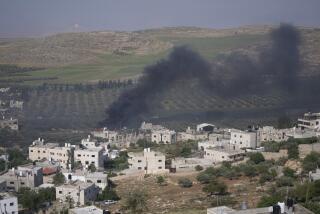From the Archives: Accused killer emerged from bitter winds
On a wind-swept hill in the upper West Bank, the man police accuse of gunning down Israeli Prime Minister Yitzhak Rabin gave a coldly furious interview in June.
Yigal Amir, an intense, dark-haired student of law and computer science, was standing in an illegal Jewish settlement called Maale Yisrael, or “ascent of Israel.” All around him were the placards of the apoplectic right. “The Land of Israel Is in Danger!” screamed one black-on-yellow banner, stretched between the improvised structures of the week-old encampment.
A portable toilet stall invited settlers to express their contempt for the government’s peace policies with each call of nature. A hand-lettered sign dubbed the toilet the “Oslo Agreement”--a reference to the Norwegian-hosted accord that began the shift to Palestinian self-rule in the occupied territories in September, 1993.
Amir explained that he hitchhiked to Maale Yisrael each day from classes at Bar Ilan University in suburban Tel Aviv, a campus known for its affinity to religious nationalists. No matter what Rabin’s government tried to do, he said, Jews would control the West Bank forever.
“This is the most holy land,” he said. “Two thousand years ago, most of the population of Israel was here, in Samaria and Jerusalem.”
The government’s “backbone is very weak, and maybe that is the reason they are willing to give up everything for peace,” he said.
Amir said the government would not survive to complete its program. He did not elaborate, and there was no indication at the time that he meant anything more than the usual opposition vow to bring down Rabin’s coalition at the polls.
He did not shout or curse, the way some demonstrators do. Slender and self-controlled, he gave the impression of holding more detailed views he did not care to share with an American reporter.
Asked, for example, about the Arab villages in view and their orchards of almond and apple trees, Amir said that just because Arabs worked the land “doesn’t mean it belongs to the Arabs.”
Would settlers move to those places next, his visitor asked.
“Maybe,” Amir replied.
Police officials here, speaking to Israeli reporters after disarming Amir and pinning him to a wall as Rabin fell bleeding, said the alleged assassin spoke with almost surreal calm. Informed that Rabin had succumbed to his wounds, the officials said, Amir expressed satisfaction.
Amir confessed, according to Israeli broadcast reports, that he had intended to kill Rabin for most of a year and at least twice had traveled to the sites of Rabin’s scheduled appearances--in January at the Yad Vashem Holocaust memorial, a visit Rabin did not make because of a terrorist bombing in Beit Lid that day, and in September at the dedication of a new highway interchange.
Israel Television aired file footage Saturday night of Amir at the September event, some distance from Rabin. He was screaming about the abandonment of 140,000 Jews, a reference to the West Bank settlers, and police removed him from the scene.
Amir hails from Herzliya, an affluent beachfront suburb north of Tel Aviv, where his mother is a kindergarten teacher and his father a biblical calligrapher. Israel Radio reported he did his army service in the elite Golani combat brigade and served as an immigration emissary of the Jewish Agency in the former Soviet Union. Both of those are sterling credentials, obtained by stiff competition in Israel.
Avishai Raviv, the chief of a right-wing extremist group called Eyal, which has been linked to violence against Arabs, said that “we knew him through our activity” but denied that Amir was a member.
“He was always nice and moderate,” Raviv said.
A classmate from Kolel, a community seminary where Amir studied, told Israel Radio that Amir did have “a connection with the Raviv gang.”
Amir’s case serves to illustrate the ability of violent extremists, including members of such banned groups as Kach and Kahane Lives, to mingle seamlessly with mainstream members of the political opposition. Kach activists, violent followers of the late Rabbi Meir Kahane, often manage to infiltrate Likud bloc rallies and attract television cameras with chants such as “Death to Rabin!”
At Maale Yisrael, where Amir was interviewed in June, he lived and worked openly amid senior representatives of the Yesha Council, the umbrella organization for Jewish settlers, and of Likud Youth.
Likud leaders supported the illegal settlement, and Likud banners were raised at the site. One of them, a turnabout on Rabin’s 1990 election slogan (“Israel Is Waiting for Rabin”) read, “Israel Is Disappointed in Rabin” and was signed, “The Likud.”
“Sadly, many nonviolent politicians on the right were encouraging extremists to adopt violent means because they themselves were using extremist rhetoric,” said Yossi Alpher, an Israeli strategist who is Jerusalem representative of the American Jewish Committee.
Menachen Friedman, an expert on Israel’s religious right from Bar Ilan University, said extremists routinely demonized left-wing leaders and believed that their elimination could change the course of events.
“I think . . . in that act he thought he would stop the peace process,” Friedman said.
Rabin’s own stubbornness gave Amir his final opportunity. Members of Rabin’s inner circle said Saturday night they had urged him for months to wear body armor under his clothes. They said he waved them off, saying he was not afraid.
More to Read
Start your day right
Sign up for Essential California for news, features and recommendations from the L.A. Times and beyond in your inbox six days a week.
You may occasionally receive promotional content from the Los Angeles Times.






